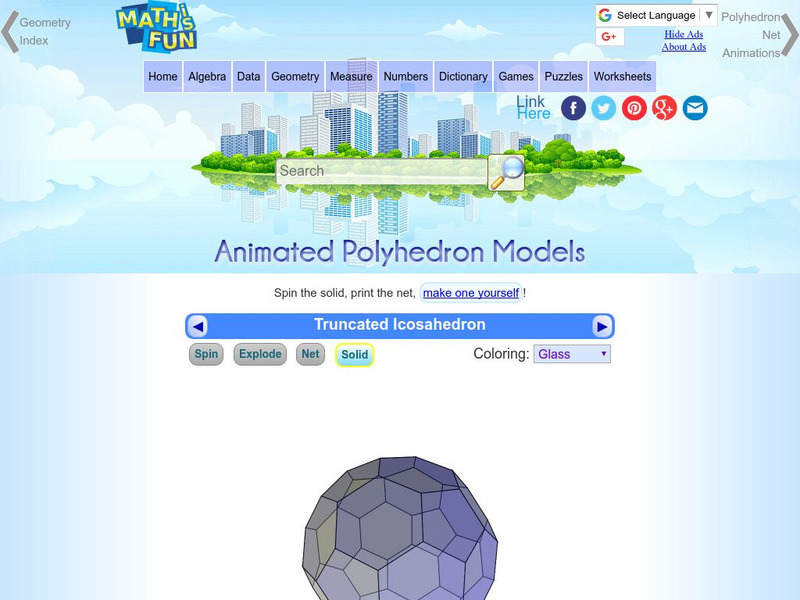Hi, what do you want to do?
Curated OER
Sketching Cylinders
Students create nets of cylinders. In this geometry lesson, students calculate the surface area of cylinders and other solids. They show their understanding of three-dimensional shapes by solving problems.
Curated OER
Foil Fun
Second graders be having hands-on experiences with three-dimensional solid shapes. They investigate the features of solid shapes and examine the names for them. They are introduced to making nets for 3D shapes.
Curated OER
Mandalas, Polygons and Symmetry
Students create a geometric pattern using mandalas, polygons and symmetry. For this geometry lesson, students analyze the mathematics involved in making the mandalas, including the shapes and symmetry. Students create their own mandalas...
PBS
Surface Area and Volume
You and your class will like this lesson on using visual models to relate the volume and surface area of solid shapes. Learners construct three-dimensional forms using nets. They calculate the surface area and volume for each and then...
Curated OER
Houses
Third graders use a number of problem solving strategies in this unit of lessons. They determine how to draw and model three-dimensional objects, use co-ordinate systems, determine probability of events, and identify paths of simple...
Curated OER
Surface Area
In this geometry instructional activity, 10th graders define surface area, net and lateral face. They calculate the surface areas of cones, prisms and cubes. There are 9 surface area questions.
Curated OER
Polydron Fun
Students investigate nets as they relate to volume and area. For this geometry lesson, students use nets as a visual to deepen their understanding of surface area and volume of objects. They make conjectures about different objects and...
Curated OER
Volume of Prisms
Learners calculate the volume of different polygons. In this geometry lesson, students identify the relationship between base and height. They calculate the area of each prism and cylinder.
Curated OER
Connecting Measurement
Learners participate in activities the connect measurement to geometry, statistics, estimation, and the real world. They collect measurements from their elbow to the tip of their middle finger and make a box plot of the data as well as...
Curated OER
Getting Familiar with Fractals
Students use the Internet to answer lab questions about fractals, and then construct fractals using the initial stage and iteration rule. They complete tables and generate rules for the "nth" term and create their own fractals.
Curated OER
Surface Area of Prisms
Students calculate the surface area of different prisms. In this geometry lesson, students identify the shapes of solids based on the properties of that solid. They calculate the surface area using nets and properties of prisms.
Curated OER
Volume Of A Cube
Fourth graders find the volume of cubes and cylinders. To determine volume, they fill large cubes with centimeter cubes. They discuss the formula used to find the volume of a cube. Students explore why the solution to the volume of a...
Curated OER
Shapes are Everywhere
Second graders gain an understanding of geometric shapes and spatial reasoning. They learn the attributes of solid shapes in everyday activities. Students compare geometric shapes to everday objects, finding things that serve a purpose...
Shodor Education Foundation
Pythagorean Theorem
Most adults remember learning about the Pythagorean theorem, but they don't all remember how to use it. The emphasis here is on developing an intuitive understanding of how and when to use the theorem. Young mathematicians explore...
Curated OER
Guess My Shape
Learners play a game with shapes. They work in groups to identify the names and characteristics of various shapes. They give each other clues to see if others can identify the shape being described. This is a great hands on activity.
Curated OER
San Diego Architecture
Eighth graders study the cultural and architectural history of San Diego. After study they create a design of a home based of features from historical and modern homes found in their research.
Curated OER
Analyzing 3-D Shapes and 2-D Representations
Students can analyze 3-D objects better with actual physical models and by also drawing 2-D representations of them.
Curated OER
Classifying Pyramids
Students study pyramids. In this prisms lesson, students explore the attributes of pyramids. Students will explore the lateral surface area of pyramids and be able to distinguish pyramids from other space shapes.
Alabama Learning Exchange
Alex: Nifty Nets
During this activity, learners will create nets for prisms. They will find the volume and surface area of the shapes. They will also use interactive activities to review three-dimensional shapes.This lesson plan was created as a result...
CK-12 Foundation
Ck 12: Interactive Geometry: 1.11 Surface Area and Nets
Explore surface areas and nets with 2D and 3D shapes.
CK-12 Foundation
Ck 12: Interactive Geometry: 9.5 Modeling in Three Dimensions
Explore connections between a 2-dimensional net and a 3-dimensional box. Later in this section, use equations with variables to solve real world problems that use 2 and 3-dimensional objects.
Other
Teach Net: Brain Binders
Brain binders are great teacher sources for problem solving and critical thinking with geometry. Students fold sheets of paper to create solid colors on each side. Various levels are included starting with two folds through five folds.
Math Is Fun
Math Is Fun: Animated Polyhedron Models
Use this tool to see animated models of over 100 different types of polyhedra. There are five options for how they appear, and you can also see the net, 'explode' the solid so that the faces are separated, or drag it to rotate it...


























